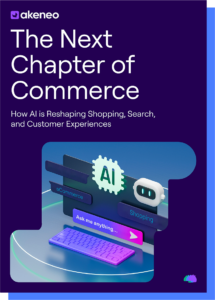The search experience is evolving, and if your eCommerce strategy is still clinging to outdated SEO tactics, you're missing the AI-powered revolution that's transforming how customers discover products. Discover why traditional SEO is no longer enough to keep up with how consumers are shopping today, and how to deliver smarter, more personalized, and more relevant results.

Table of Contents
Keywords
In the early days of digital marketing, search engine optimization (SEO) felt like a secret weapon. Marketers could strategically weave a handful of high-value keywords into their content and reliably climb the search rankings.
But today’s consumers (and search engines) aren’t playing by those old rules anymore. Shoppers expect personalized, intelligent results that understand not just what they type, but what they mean. As customer behavior becomes more dynamic and nuanced, traditional SEO strategies are starting to show their age.
For years, traditional SEO has centered on optimizing webpages to rank for specific keywords and phrases, which is an approach that worked well when search behavior was relatively linear. Marketers would identify a set of high-volume terms, sprinkle them throughout their content, and hope to climb the search rankings.
But this strategy hinges on a flawed assumption: that all users search in a uniform, predictable way. In reality, nothing could be further from the truth.
Today’s consumers search dynamically. They don’t enter basic keywords into the Google search bar. Instead, they ask complex, nuanced questions, often phrased conversationally. One user might type in “affordable black dress shoes,” while another says, “What are the best shoes to wear to a wedding on a budget?” Both are expressing similar needs, but a keyword-dependent search engine may not treat them the same.
This creates a major disconnect between how people search and how content is traditionally optimized. Businesses still locked into exact-match SEO strategies may be missing out on high-intent traffic simply because their content isn’t designed to interpret the full context of modern search behavior.
Legacy SEO tactics also tend to flatten the spectrum of user intent. Someone casually exploring options, someone comparing brands, and someone ready to purchase right now all approach search with very different goals, and they use very different language to express those goals. But conventional SEO fails to differentiate these intents, often offering the same generic results to vastly different shoppers. This one-size-fits-all approach forces marketers to guess at intent rather than respond to it, leading to irrelevant content and a disjointed customer experience.
What’s needed is a more agile, intelligent approach, one that goes beyond keywords to understand meaning, context, and intent. Businesses that continue to rely on traditional SEO may find themselves falling behind competitors who embrace emerging, AI-powered tools that are designed for the dynamic, real-world way people actually search today.
AI enables a fundamental shift from keyword matching to true intent understanding, radically improving the way customers discover products online.
Take, for example, a shopper who searches for “a couch that’s pet-friendly and fits a small apartment.” This is a multi-faceted request combining lifestyle needs, material preferences, and spatial constraints. A traditional search engine would likely return generic couches tagged with even just one of those keywords included in the search, leaving the customer to sift through oversized leather sectionals or linen pieces prone to staining.
An AI-powered search engine, however, takes a very different approach. It interprets the request holistically, pulling from a wealth of data sources to understand what “pet-friendly” really means in a practical sense. It analyzes customer reviews to identify which couches stand up best to pet hair and claw marks, evaluates dimensions against standard apartment living room layouts, and filters for fabrics that repel spills, all while factoring in prior browsing behavior or known preferences. The result? A curated list of apartment-sized sofas with performance fabric, praised by pet owners, and ranked highly for durability - precisely what the shopper had in mind.
This level of intelligence is changing the game. By recognizing the real-world intent behind each query, AI connects shoppers to the products they want and that fit their needs, not just the ones that happen to share a few common buzzwords. That leads to less friction, faster discovery, and a dramatically better customer experience.
Brands that adopt AI-driven discovery tools are already seeing results: average revenue increases of 10–12%, improved customer satisfaction, higher conversion rates, fewer returns, and more.
AI is also redefining how product information is managed behind the scenes. From automatically enriching product descriptions based on customer feedback, to dynamically updating attributes in response to seasonal trends or localized needs, AI turns rigid product catalogs into living, learning systems. Businesses can respond to changing consumer behavior in real time - no manual re-tagging or endless re-optimization required.
Ultimately, AI is enabling a shift from reactive to proactive eCommerce. Instead of waiting for customers to find the right combination of words, businesses can anticipate needs, tailor experiences, and surface the most relevant options instantly. In a world where digital attention spans are short and competition is high, that kind of intelligence becomes a competitive advantage.
The days of static SEO are behind us. Search is no longer about stuffing pages with the right words; it’s about understanding context, intent, and behavior in real time. AI-powered search is ushering in a new era of eCommerce where brands that embrace intelligent, adaptive, and conversational experiences will come out ahead.
To compete, businesses need to move beyond rigid keyword lists and start thinking like their customers: curious, nuanced, and constantly evolving. In doing so, they won’t just show up in search results, but they’ll stay ahead of them.
Discover how AI is transforming shopping, search, and product experiences, and why clean, structured data is the key to staying competitive in the next era of commerce.
